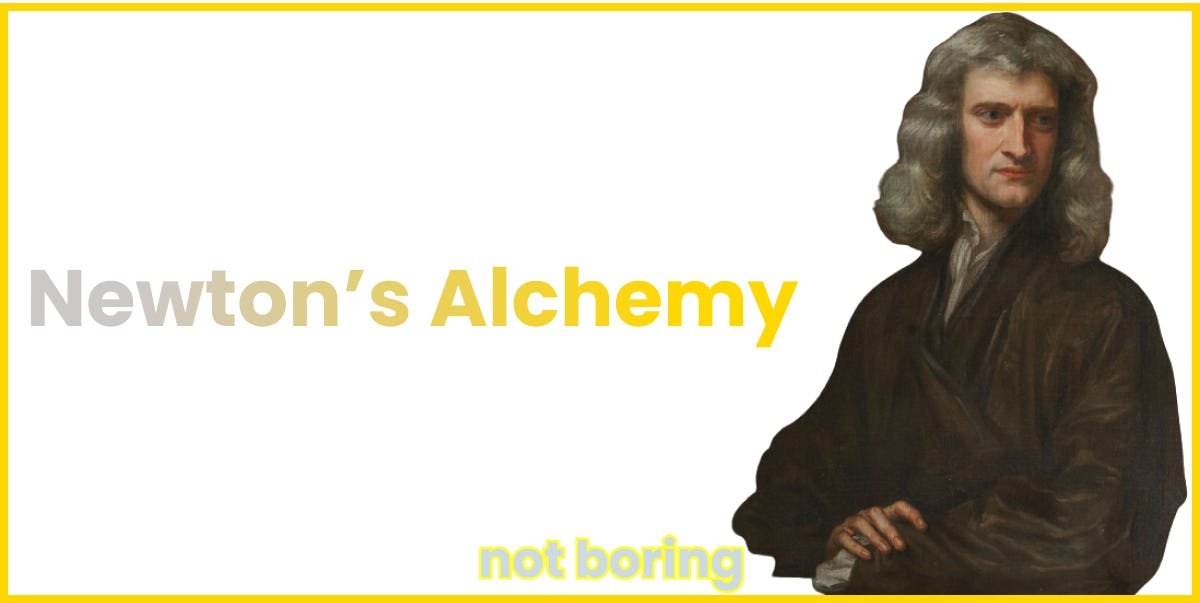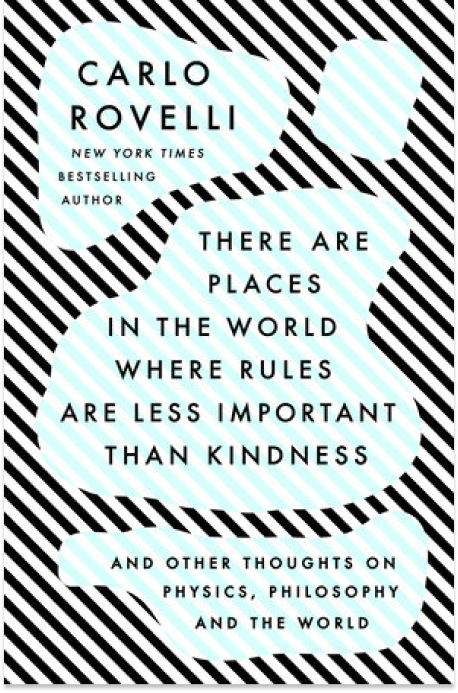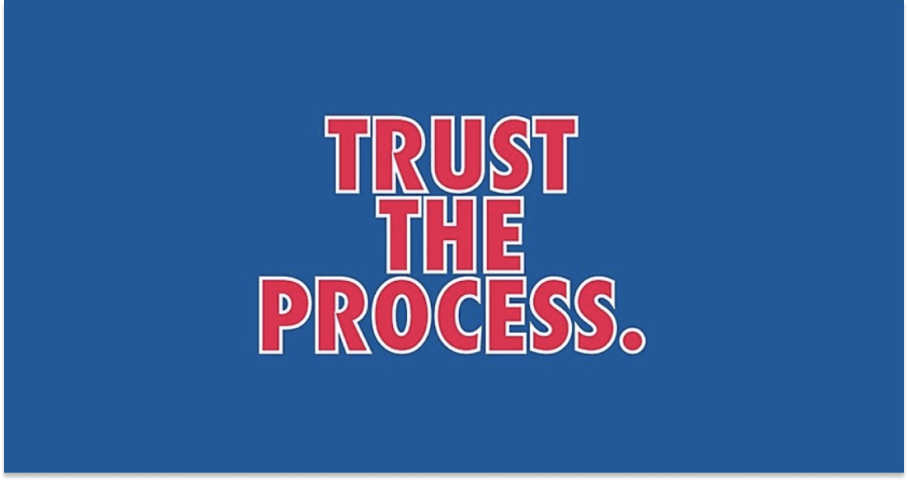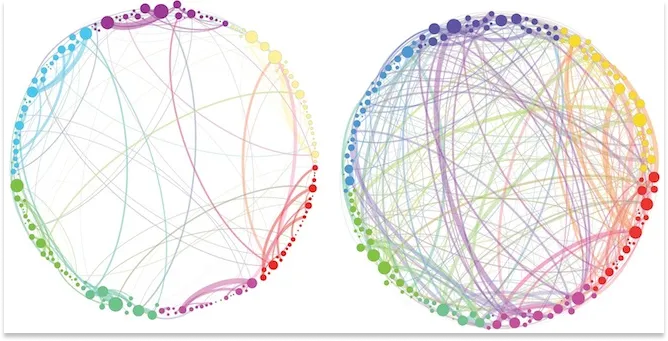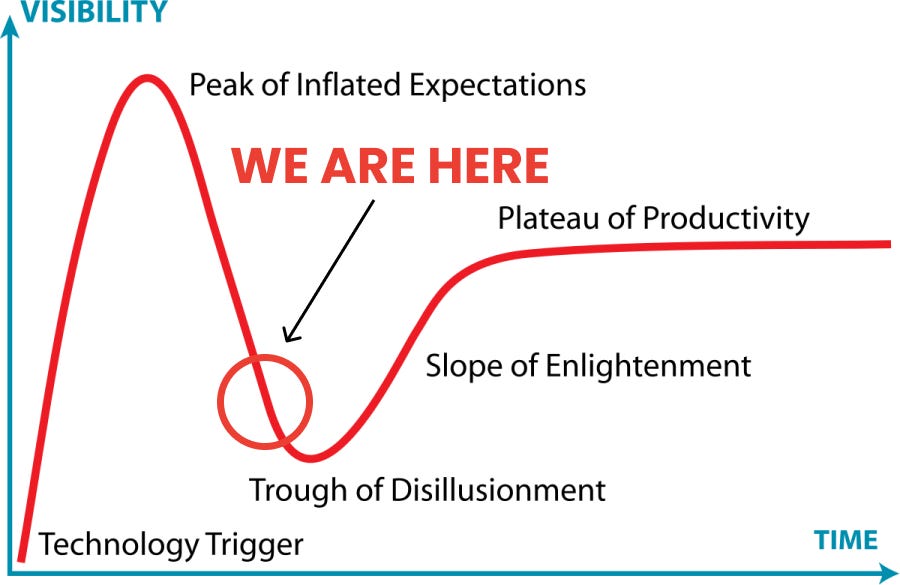

Newton's Alchemy
source link: https://www.notboring.co/p/newtons-alchemy?s=r
Go to the source link to view the article. You can view the picture content, updated content and better typesetting reading experience. If the link is broken, please click the button below to view the snapshot at that time.
Newton's Alchemy
A Celebration of Failed Experiments and Progress
Welcome to the 2,401 newly Not Boring people who have joined us since last Monday! If you haven’t subscribed, join 123,145 smart, curious folks by subscribing here:
🎧 If you’d rather listen to this essay, head over to Spotify or Apple Podcasts
Today’s Not Boring is brought to you by… Causal
In today’s essay, I make a case for optimism during the crash. But optimism needs to be paired with smart planning, and that’s where Causal comes in.
Causal is a spreadsheet built for number-crunching — financial modeling, business planning, but really anything involving calculations. It's like Excel minus the arcane formulas (no more Sheet1!$E$4 or VLOOKUPs), plus live data integrations (accounting systems, CRMs, etc), and really cool shareable dashboards.
Given current market conditions, every startup needs a solid financial model to steer the ship. I've worked with the Causal team to create the Startup Suite — a set of 4 template models for early stage companies:
They've put together detailed video walkthroughs for each model in their documentation. Use one of my templates above as a starting point, or click below to just sign up for the product and start playing around:
Hi friends 👋 ,
Happy Monday! Let’s hope this week is better than last week.
Last week was tough. The markets were brutal. Venture dried up beyond pre-seed and seed. Terra-Luna accelerated the crypto crash.
I don’t know what happens in the next few weeks or months. Anyone who tells you they do is full of shit. And I’m certainly not about to jump on the bearish sentiment bandwagon.
So instead, let’s zoom out, get a little perspective, and take a shot of historically-informed optimism.
Let’s get to it.
Newton’s Alchemy
Last week, as the markets melted down, a timely gift from Past Packy showed up in my Kindle Library.
When I was on my Carlo Rovelli kick a couple months ago, I pre-ordered his upcoming book, There Are Places In The World Where Rules Are Less Important Than Kindness. When I opened my Kindle app on Tuesday, there it was. Perfect timing.
There Are Places In The World Where Rules Are Less Important Than Kindness is a collection of newspaper articles Rovelli wrote from 2010-2020 on physics and philosophy. Each is characteristically beautiful and thought-provoking. One was so timely it slapped me in the face.
Newton the Alchemist, originally published on March 19, 2017, deals with the seeming contradiction between “the traditional image of him [Newton] as the father of science” and his lifelong pursuit of the now-discredited field of alchemy.
Why would such a rational thinker – the rational thinker – waste decades in pursuit of something so frivolous and irrational?
Was it a vain hope in the first place? Was it a project that should have been discarded even before it began?
On the contrary: many of the key problems posed by alchemy, and quite a few of the methods it developed, in particular with reference to the transformation of one chemical substance into another, are precisely the problems that would soon give rise to the new discipline of chemistry.
Newton does not manage to take the critical step between alchemy and chemistry. That would be down to scientists of the next generation, such as Lavoisier, to achieve.
Like a good bubble, alchemy’s promise of gold and immortality attracted a swarm of smart people, including Newton, to try to crack the code. The exhaust of their failed attempt created a new, bigger, and much more important field of study.
Without alchemy, there is no chemistry (or, at least, chemistry doesn’t arrive as quickly). More generally, without experimentation and curiosity and adventures down ultimately fruitless rabbit holes, there is no progress.
The allure of alchemy is obvious. Greedily, the power to turn base metals into gold would make its early discoverers wealthy and powerful. Beautifully, the ability to turn base metals into gold, to bend the previously-understood laws of the universe, would be a testament to human ingenuity.
But alas, not even Sir Isaac Newton could turn shit into gold, not even after decades of work.
Isaac Newton seems like an odd person to fail at alchemy.
Odd that he failed because we’re talking about the guy who discovered the three laws of motion, the theory of universal gravity, that white light is a mixture of colors, and differential calculus. His tomb at Westminster Abbey reads, “Sibi gratulentur Mortales, Tale tantumque exstitisse HUMANI GENERIS DECUS,” which translates to “Mortals rejoice that there has existed such and so great an ornament of the human race!” (Puja: take notes.)
Odd that such an ornament to the human race even tried because we’re talking about alchemy, a debunked pseudo-science. As one Quora user explained, “Alchemy blurs the line between empirical observation and experimentation, baseless speculation, and mysticism in a way that made perfect sense to the alchemists but makes absolutely no sense to us. And the latter two make it not science.” What a shame that he wasted so much of his precious brainspace on alchemy, right?
Not so fast. Rovelli points out that, “Today it is easy to rely on the well-digested historical judgment that alchemy had theoretical and empirical foundations that were far too weak. It wasn’t quite so easy to reach this conclusion in the seventeenth century.”
In other words, alchemy has been debunked for three centuries now, but when Newton was working, it hadn’t yet been. It took many smart people rigorously (and, to be sure, many dumb people loosely) experimenting and trying to make alchemy work and failing to learn that it couldn’t. And the discoveries in the process led to something much more valuable than all the gold in the world: chemistry.
If, with modern day knowledge, you could go back in time and stop Isaac Newton from attempting alchemy so that he could direct his attention to something more practical, you wouldn’t.
You gotta, as any Sixers fan would tell you…
Innovation is rarely a discrete result of a lightning strike moment. It’s a progression and an evolution, a composition of previous failures and successes with a new twist.
Alchemy isn’t the only example of this winding road phenomenon in Newton’s career. In The Beginning of Infinity, David Deutsch explores the progression of theories describing planetary motion from Kepler to Newton to Einstein. Each successive theory seems to throw out the prior one:
Einstein’s explanation of planetary motion does not merely correct Newton’s: it is radically different, denying, among many other things, the very existence of central elements of Newton’s explanation, such as the gravitational force and the uniformly flowing time with respect to which Newton defined motion.
Newton discovered the force of gravity. Einstein threw that idea out, along with uniformly flowing time. So was Newton’s work for naught? Useless?
Au contraire. “Although there is no force of gravity,” Deutsch writes, “it is true that something real (the curvature of spacetime), caused by the sun, has a strength that varies approximately according to Newton’s inverse-square law, and affects the motion of objects, seen and unseen.”
Keep what’s true and valuable, discard the rest, try the next thing. Once again, Newton pointed future generations in the right direction.
Newton showed Einstein where to look and what to improve upon. Without Newton, Einstein may have spent his time making those same discoveries instead of figuring out general relativity, and Heisenberg might have spent his time figuring out general relativity instead of establishing quantum mechanics, and so on. Incomplete or even downright incorrect solutions are a necessary part of the process.
Alchemy failed, but science prevailed. Gravity failed, but science prevailed.
Newton, of course, is not unique in his ability to fail in the right direction. In another article, October 2016’s Ramon Llull: Ars Magna, Rovelli tells the story of the 13th century Majorcan philosopher, Ramon Llull.
Llull’s Ars magna, or “great art,” was a system “oscillating between metaphysics and logic, expressed in the form of tables, graphics, moving paper circles” that “intended to bring order to the world, and to convert Jews and Muslims to Christianity.”
“These objectives, it would be fair to say,” wrote Rovelli, “he decidedly failed to reach.”
His ideas, though, lived on, and they’ve had an unbelievably huge impact.
Four hundred years after Llull’s death, the 17th century mathematician Gottfried Wilhelm Leibniz ran his ideas back, kept the true and valuable, discarded the rest, and rebranded what was left as “combinatorial art.” With the idea, Leibniz designed the first calculating machine, “acknowledged as the progenitor of all modern computers.”
The rebranded combinatorial art is also “at the root of modern developments in logic conceived as a universal grammar of rationality.” Graphs, images “that codify the way in which a certain number of elements are connected with each other,” were also invented by Llull.
Brain Graph off and on Psilocybin, Proceedings of the Royal Society Interface
Llull’s “failure” led to the computer, modern logic, and graphs. History is littered with similar examples, famous and hidden. There is no progress without experimentation and failure.
But in a market like the one we’re in right now, it’s easy to lose sight of that.
It’s not hard to imagine Ramon Llull as a modern founder getting absolutely obliterated in Business Insider or The Information for failing to bring order to the world. Even Newton – Newton! – would get fileted for his foolish pursuit of fool’s gold.
I read Newton the Alchemist in the middle of the most on-the-nose alchemy comparison possible. Do Kwon and Terra tried to turn shit into gold with ponzinomics and bravado, they failed, and kneecapped an already-weakening crypto market in the process.
Like alchemy, the allure of creating billions of dollars out of thin air via undercollateralized algorithmic stablecoins was too appealing for humans not to try. The problem was, in this case, algorithmic stablecoins using similar seigniorage mechanics had already been tried over and over again – even, reportedly, by Do Kwon himself! Basis Cash, the project Do Kwon allegedly founded pseudonymously, failed, as did Empty Set Dollar, IronFinance’s TITAN, and more.
Retrying the same ideas in a frothier market and pumping harder with the same broken underlying mechanics wasn’t a useful experiment. No new seed of the real valuable idea was sowed in the process – no chemistry from this alchemy. Worse, regular people lost their life savings, and it seems as if a handful have taken their own lives as a result. That’s tragic and terrible and the people responsible should be held accountable to the fullest extent possible.
But I’m worried that in crypto, and across the markets more generally, the sentiment – or vibe, as the kids would say – is in danger of shifting too far away from experimentation.
That shows up in all of the proud crypto bears loudly proclaiming the whole thing was a scam all along and the fintwit pseudos ripping Peloton and Shopify and Zoom and the other companies whose inventions made an awful pandemic a lot better for a lot of people.
I’d bet (Not Financial Advice™️) that Zoom, Peloton, and Shopify are all worth more in five years than they are today, but even if they go to zero, I don’t see the value in dunking on companies who’ve at the very least made work, fitness, and entrepreneurship more accessible and pushed those categories forward because the market overvalued them.
We’re guilty of this on both sides: lionizing companies and their founders for high valuations, and ripping them to shreds when valuations fall.
That’s the weirdest part of a bear market: the people who are rooting for something other than other people to succeed and humanity to progress are the ones winning. If the long arc of market history is any indication, they won’t be winning for long, or over the long-term, but the environment that it creates in the interim feels super dark.
(And yes, on the other side, idiots like this are not people you want to see winning, either.)
A bear market price reset is a good thing in many ways. It’s a much less profitable environment for scammers. Terra doesn’t build up an $18 billion algorithmic stablecoin by promising 20% APY in a market like this. A lot of the me-too companies rushing at the same opportunity for the cash grab opportunity will go away. A higher proportion of talent and resources will flow to the strongest companies, the ones with the biggest ambitions and most differentiated products.
But a bear market attitude reset can be harmful to the extent it encourages dunking on those who’ve tried earnestly and failed and discourages experimentation.
I saw a tweet the other day – and the person who tweeted it seems smart and nice, and they represent a commonly-held view, so I’m not going to call them out by name – that said something along the lines of:
“I’m bullish on cryptocurrency, bearish on nonsensical use cases.”
Which sounds like a sensible thing to say, particularly in a market like this, but … entirely misses how things work. You need experiments and nonsensical applications to get to the useful ones. You need alchemy to get to chemistry. You need Ars magna to get to the computer. Apple started out as a nonsensical homemade computer. Facebook started out as a way to creep on Harvard girls.
Bull markets and bear markets are both natural parts of the cycle. Having spent so much time in the former, we were overdue for the latter. My hope is that people don’t stop trying weird stuff and that investors don’t stop funding weird stuff.
While bull markets invite scams and unproductive rehashings of old ideas, they also create an environment in which risk-taking is celebrated and rewarded. Investors flooding the market with cash is a feature, not a bug.
And I’ll say this for tech bubbles: they’re productive, especially compared to banking bubbles.
The depressing part of the 2008 Global Financial Crisis (GFC) – aside from the bankruptcies and the families losing their homes – was just how useless it was. Meaning: humanity was no better coming out than we were going in.
Sure, innovation happened during and as a result of the crisis:
Airbnb and Uber were founded in 2008 and 2009, respectively.
Both fintech and crypto were born out of the GFC.
This decade-plus-long bull market, spurred by low rates and cheap money, had its roots in the bailout and the Fed’s quantitative easing.
But the bubble itself… practically useless. Unlike the dot com bubble, it didn’t dump money on innovation. We didn’t emerge from the GFC with a metaphorical overabundance of fiber that would power the internet’s explosion in the next wave.
Over the past week, as the markets melted down, I’ve seen a lot of The Big Short memes and GFC comparisons floating around Twitter. They miss the mark. Having worked in both – I interned at Bank of America in 2008 and came back to work at Bank of America Merrill Lynch in 2009 – these are very different environments.
Over the past few years, money and talent have swarmed opportunities in work, biotech, climate, space, web3, education, and beyond in ways that will accelerate our progress in those areas and propel humanity forward.
The Global Financial Crisis was just a crash. It’s not like we just got a little overexcited about the potential of Collateralized Debt Obligations (CDOs) full of subprime mortgages, learned some lessons, and used those to build a much more productive CDO-based system. We just did a lot of financial engineering, it blew up, banks got bailed out, and we moved on to the next thing.
Today’s bubble and crash feel much, much more like we’re just riding the Hype Cycle across a bunch of new technologies simultaneously, and that we’re on that well-skied slope from the Peak of Inflated Expectations to the Trough of Disillusionment.
So now the focus switches from squeezing the juice out of the hype to panning for the nuggets of gold in the rubble – the failed experiments with useful lessons and the successes that might be more successful if tweaked just so – and building new experiments and products with those as a starting point.
I would be shocked if, for example, in a few years, both DeFi and NFTs weren’t a much, much bigger part of peoples’ lives, even if we barely use those acronyms. The hype – the monkey jpegs and “nonsensical use cases” – attracted energy, excitement, money, and talent, which combined to create new primitives that a more sober market will figure out how to apply usefully and profitably.
Similarly, the funding that washed over every sector of tech accelerated our learning and progress by years:
New API-first companies to handle so many important-but-non-core functions will let the next wave of builders focus more on what makes them unique.
The mania around electric vehicle companies means that there will be more EVs on the road sooner than there otherwise would have been.
A flood of launch and satellite companies, even if a little bubbly, means we’ll be able to do more in space – from mining to manufacturing to Mars colonization – sooner than we otherwise would have.
The list goes on and on and on. Just this week, Google’s DeepMind introduced Gato, a generalist AI model that can do a lot of different things pretty well versus one thing really well, like GPT-3 or DALL·E 2 does.
OpenAI just released DALL·E 2 last month, in April. Already, the fact that we can type a few words and AI will make beautiful, accurate, novel images from them, feels normal.
Oh yeah, and the Curiosity Rover just found what looks like a door carved into a rock face on Mars:
Even while the market tumbles, progress marches on. There’s no doubt that things are going to get crazier than they’ve been. So take this rare calm as an opportunity.
While everything is slow – whether for another week or another year – it’s a good time to reflect, learn, and plan. There are valuable lessons, tools, and guideposts littered among both the successes and failures of the past few years.
Does that mean that we’re going to get it all right from here on out? I hope not! That means we’re not experimenting enough, not getting weird enough.
Just make sure that you don’t overleverage yourself so that you can keep playing, and that you’d be proud to be working on what you’re working on even if it failed. Create novelty with rigor. Do something that inspires you, and those around you, regardless of price.
For the strongest companies, now is the best time to build. It’s quiet. Facebook isn’t paying $8 million per year for junior engineers. You won’t be surrounded by tourist competitors trying to make a quick buck, because there won’t be as many quick bucks to be made.
But there will be even bigger pools of slow bucks up for grabs on the way out of this, for those who can keep their eyes on the horizon. Trillions of dollars are in play in the next decade for those who create abundant energy, fix healthcare, rebuild the financial system, and take humanity beyond the Earth.
We keep experimenting and failing and learning and tweaking. The best is yet to come.
Thanks to Dan for editing!
Thanks to everyone who’s filled out the Not Boring Reader Survey! If you didn’t get a chance to, I’d really appreciate it if you took 3 minutes to do it now:
Thanks for reading, and see you on Thursday for something new,
Packy
Recommend
About Joyk
Aggregate valuable and interesting links.
Joyk means Joy of geeK

